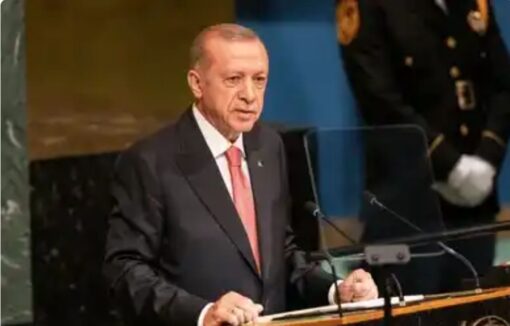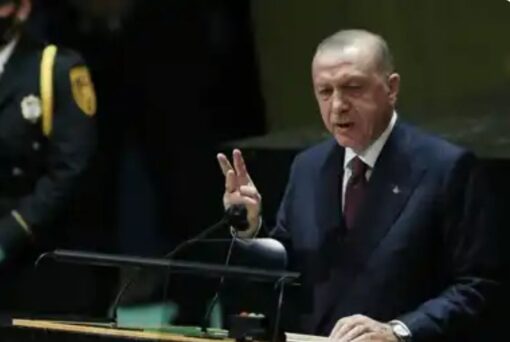The war on Gaza has transformed the United Nations General Assembly into an arena of urgent diplomacy, and United States President Donald Trump has placed himself at the heart of it by spearheading Gaza peace talks with Arab and Muslim leaders.
Meeting on the sidelines of the gathering in New York, Trump outlined a controversial plan to end Israel’s devastating war on Gaza, a plan that Turkish President Recep Tayyip Erdogan praised as the outcome of a “fruitful” session.
With international outrage mounting over the conflict and the humanitarian disaster deepening by the day, the talks mark the most serious attempt yet to shift the war’s trajectory.
For two years, Gaza has endured unrelenting airstrikes and siege conditions. More than 65,000 Palestinians have been killed, while thousands more face starvation, lack of medical care, and mass displacement.
Israel insists its military campaign is necessary to eliminate Hamas, but rights groups accuse Tel Aviv of pursuing a war strategy that amounts to collective punishment and possible genocide.
The urgency of Gaza peace talks reflects the international community’s recognition that the war cannot continue without destabilizing the wider Middle East and damaging global trust in international law.
Trump gathered leaders from Egypt, Jordan, Saudi Arabia, Qatar, Turkiye, the United Arab Emirates, Indonesia, and Pakistan for the private session. The former president described this coalition as “the group that could do it,” a bloc of nations with both the political clout and financial capacity to influence Gaza’s future.

Although Israel was excluded from the initial talks, Prime Minister Benjamin Netanyahu was briefed on the framework, a paradox that underscores the sensitivity of a process that aims to reshape Gaza without its principal adversary at the table.
The outlines of Trump’s Gaza plan are beginning to emerge. He urged Arab and Muslim countries to deploy peacekeeping troops to Gaza as part of a transitional arrangement designed to enable Israel’s withdrawal.
This would be coupled with a multinational funding pool for humanitarian relief and reconstruction, with investments in housing, education, and healthcare intended to rebuild Gaza from the ruins.
The Palestinian Authority would eventually take administrative control, though Israel has consistently resisted any expansion of PA authority. The exclusion of Hamas from the talks, and the requirement that the group be disarmed, remain central to Washington’s conditions.
For Arab and Muslim leaders, the proposal represents both opportunity and risk. On one hand, Gaza peace talks led by the United States create the possibility of ending the bloodshed.
On the other, they raise concerns about legitimizing an approach that sidelines Hamas while absolving Israel of responsibility for the destruction. Qatar’s Emir Sheikh Tamim bin Hamad Al Thani, who has mediated multiple ceasefire proposals, called on Trump to use his influence decisively.
“We count on your leadership to end this war and to help the people of Gaza,” he said, warning that Israel’s deeper objective was to erase Gaza’s viability by destroying homes, schools, and hospitals.
Erdogan, who has long denounced Israeli policies, described the meeting as “fruitful,” signaling guarded optimism about Trump’s Gaza peace talks.
Having previously used his UN address to urge the world to act against atrocities in Gaza, Erdogan’s endorsement carries symbolic weight. His words echoed a growing belief that, despite doubts about Trump’s style, only Washington has the leverage to push Israel toward compromise.
The global diplomatic landscape is shifting rapidly. More than 150 countries have now formally recognized Palestine as a sovereign state, a wave of recognition that has left the United States increasingly isolated in its defense of Israel.
Washington’s traditional role as Israel’s diplomatic shield at the UN is under scrutiny, particularly as images of mass graves, destroyed hospitals, and starving children in Gaza circulate worldwide.
UN Secretary-General Antonio Guterres sharpened this divide by declaring that Palestinian statehood “is a right, not a reward,” directly challenging Trump’s claim that recognition only encourages conflict.
Trump’s remarks before the assembly blended calls for an immediate ceasefire with criticism of Western allies. He demanded that the war end “immediately,” yet accused France, Britain, and Portugal of rewarding Hamas by recognizing Palestinian statehood.
This duality reflects Trump’s broader foreign policy strategy: a mix of confrontation and pragmatism designed to preserve US dominance while signaling flexibility to Arab and Muslim audiences. In the context of Gaza peace talks, it underscores his attempt to play both mediator and enforcer.
Diplomats acknowledge that Trump may indeed be the only leader capable of shifting Israel’s stance. Veteran UN correspondent James Bays observed, “Israel has one supporter in the Security Council, one supporter providing the money, one supporter providing the weapons. And that supporter is the United States.
The key man, the one man who can change things, is Donald Trump.” This perception, widely shared among delegates, is what lends the Gaza peace talks their unique importance.
Still, doubts remain over whether the initiative can succeed. Critics argue the plan is less a genuine peace effort and more an attempt to outsource Gaza’s burden to Arab and Muslim states.
Humanitarian groups insist that any serious framework must prioritize immediate aid delivery, not just long-term reconstruction. The absence of Hamas from the talks risks leaving Gaza trapped in cycles of resistance and repression, no matter who governs formally.
Indonesia’s President Prabowo Subianto announced his country’s willingness to send peacekeeping troops, highlighting the readiness of Asian Muslim nations to engage directly in Gaza peace talks.
Pakistan and Malaysia have hinted at similar openness, signaling that the Muslim world may be prepared to form a collective security role if the United States provides guarantees. This momentum suggests that Trump’s proposal, even if incomplete, has tapped into a regional desire for greater agency over Gaza’s future.
Yet Israel’s government remains defiant. Netanyahu and his ministers have repeatedly dismissed international pressure, insisting that the war will continue until Hamas is dismantled.
For Netanyahu, Trump’s Gaza peace talks present a dilemma: alienating Washington risks strategic isolation, yet accepting limits on Israel’s military campaign threatens his political standing at home. The tension between these imperatives will likely shape the next phase of negotiations.
The urgency is amplified by protests worldwide demanding an end to the war. From London and Paris to Amman and Jakarta, demonstrators have filled streets, carrying placards that denounce Israel’s bombardment and call for justice for Palestinians.

Human rights organizations warn that temporary ceasefires or symbolic peacekeeping deployments will not resolve the deeper issue of occupation. For many, Palestinian statehood and accountability for war crimes remain the only path to lasting peace.
As the General Assembly continues, Trump’s Gaza peace talks will remain in the spotlight. The coming weeks will determine whether the momentum translates into real commitments or fades into yet another round of failed diplomacy.
Erdogan’s description of the talks as “fruitful” has raised expectations, but the ultimate test lies in whether Arab and Muslim leaders can forge unity, whether Israel can be pressured to compromise, and whether the United States is truly prepared to use its influence for peace rather than perpetuate the status quo.
For the people of Gaza, facing bombardment, starvation, and displacement, the stakes could not be higher. The outcome of these Gaza peace talks may decide not only the future of the territory but also the credibility of international diplomacy in confronting war and injustice.


